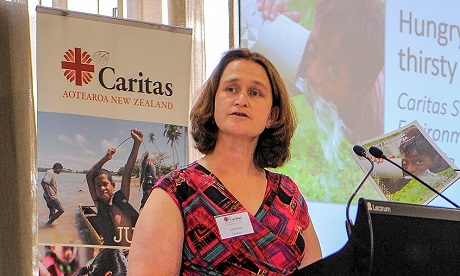The Intergovernmental Panel on Climate Change’s latest report on climate science makes the Earth’s current situation clear.
It confirms with greater certainty and immediacy the need for rapid action to cut greenhouse gas emissions. It confirms we must prioritise the poor and future generations in adapting to an uncertain climatic future, says Caritas Aotearoa New Zealand.
“Oceania peoples on the frontlines of climate change have seen significant impacts of climate change and other environmental losses since before the turn of the century,” says Caritas Director Julianne Hickey (pictured).
“Eroded shorelines, salination of soil and water, destruction of food crops, livelihoods and shelter through increasingly severe extreme weather events. We have documented those impacts in often overlooked communities through our Oceania environment reports since 2014.
“We know climate change is hitting the poor the hardest. We know climate finance is not reaching some of the poorest and most vulnerable communities in Oceania. And we know they are often left out of key decisions being made on adaptation and mitigation.”
Hickey says recent extreme weather events affecting our country – and power blackouts this week – are a further reminder that we need to address our energy sources as well as supply and demand issues.
The answer to these reminders involves careful stewardship.
“Humanity must exercise careful stewardship of earth’s resources for the benefit of all,” says Hickey.
“We cannot tackle the climate crisis solely through new technology and spending money.”
She says what we need to do is address intertwined social, economic and environmental issues together.
“Reduction of greenhouse gases and real climate justice can’t be at further cost to the earth, the poor or future generations.”
The Caritas network and other Catholic individuals and groups will be present at critical United Nations conferences later this year on biodiversity and climate.
Their roles will be to call for strong action to protect and restore the environment for future generations and to ensure the poor of today are not left out.
“We need an integrated approach that recognises the good things of the earth and the products we derive from nature are to be shared fairly and equitably,” says Hickey.
“We need to ensure all people can lead healthy, sustainable lives with dignity, and connected to their respective cultures and communities. We are one human family, sharing a common home.”
Source
- Supplied – Caritas Aotearoa New Zealand
- Image: NZ Catholic
News category: New Zealand.




